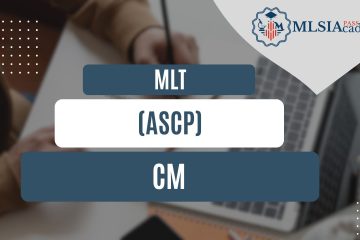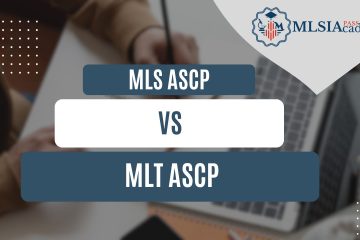ASCP MLT Test Outlines: What You Need to Learn?
To make the preparation journey easy for ASCP medical laboratory technician exam hopefuls, the board determined the ASCP MLT test outlines.
To pass the exam, one needs to encompass these outlines with deep comprehension.
In this article, we will describe all these ASCP MLT test outlines for each subject.
ASCP MLT Test Outlines: For Blood Banking
What do you need to get to pass the MLT ASCP certification? Below are the complete details.
- Blood products
- Donors
- Processing
- Storage
- Blood components
- Blood components quality control
- Blood group systems
- Genetics
- Biochemistry/antigens
- Role of blood groups in transfusion
- Blood group immunology
- Immune response
- Immunoglobulins
- Antigen-antibody interactions
- Complement
- Physiology and Pathophysiology
- Physiology of blood
- Hemostasis and coagulation
- Hemolytic disease of the fetus and newborn
- Anemias
- Transplantation
- Serologic and Molecular Testing
- Routine tests
- Reagents
- Application of special tests and reagents
- Leukocytes/platelet testing
- Quality assurance
- Transfusion practice
- Indications for transfusion
- Extracorporeal and apheresis circulation
- Component therapy
- Patient blood management & blood administration
- Adverse effects of transfusion
ASCP MLT Test Outlines: For Urine/Other Body Fluids
- Urinalysis and Body Fluids (Semen, amniotic, CSF, serous, feces, etc.)
- Physical
- Chemical
- Microscopic
- Disease conditions
- Renal physiology
ASCP MLT Test Outlines: For Chemistry
- General chemistry
- Carbohydrates
- Lipids
- Heme derivatives
- Proteins and enzymes
- Enzymes
- Proteins & other nitrogen-containing compounds
- Acid-Base, electrolytes and blood gases
- Determination of acid-base
- Electrolytes
- Special chemistry
- Endocrinology
- Vitamins and nutrition
- Toxicology
- Therapeutic drug monitoring
ASCP MLT Test Outlines: For Hematology
- Hematology physiology
- Function
- Production
- Destruction
- Hematology disease conditions
- Leukocytes (WHO classification)
- Erythrocytes
- Platelets
- Hamatology lab test
- Hemoglobin
- Cell counts, including blood and other body fluids
- Indices
- Flow cytometry immunophenotyping
- Morphology evaluation and differentials
- Hematocrit
- Other studies
- Cytogenetic and molecular testing
- Hemolytic indicators (LD, haptoglobin, etc)
- Special stains
- Hemostasis
- Physiology
- Lab determinations
- Disease states
ASCP MLT Test Outlines: For Immunology
- Principles of immunology
- Complement
- Antigen-antibody interactions
- Immunoglobins
- Immune system physiology
- Disease of the immune system
- Immunodeficiency
- Ommunoproliferative disease
- Hypersentivity
- Autoimmunity
- Transplantation
- Tumor immunology
- HLA typing
- Graft versus host disease
- Serologic procedures
- Immunoflurescence
- ANA
- Rheumatoid factor
- Treponemal syphilis testing
- Labeled immunoassays
- Nontreponemal syphilis testing
- Infectious disease serology
- Epidermiology of viral pathogens and their clinical significance
- Test results
- Disease state correlation
- Interpretation
- Confirmatory testing
ASCP MLT Test Outlines: For Microbiology
- Preanalytic methods
- Sample processing
- Specimen transport and collection
- Stains: Interpretation, principle, and procedures
- Stains: Methods and principles
- Analytic methods for bacteriology
- Bone marrow and blood
- Blood fluids from normally sterile sites
- Cerebrospinal fluid
- Lower respiratory
- Gastrointestinal
- Upper respiratory
- Bone, soft tissues, and skin
- Urine
- Genital tract
- Methods for identification (Application, theory, and interpretation)
- BSL-3 pathogens & select agents (bioterrorism)
- Antibiotic resistance
- Antimicrobial susceptibility testing
- Analytic methods for mycology, parasitology, mycobacteriology, and virology
- Virology
- Mycology
- Mycobacteriology & Nacardia spp
- Parasitology
- Postanalytic methods
- Issuing corrected reports
- Critical and urgent value reporting
- Documentation practices
- Autoverification and result review
- Prevention & public health
- Reporting to infection control
ASCP MLT Test Outlines: For Laboratory Operation
- Troubleshooting
- Compliance
- Point-of-care testing
- Quality control
- Preanalytical, postanalytical, and analytical
- Regulation
- Safety
- Practices and safety programs
- Emergency procedures
- Lab mathematics
- Normality
- Dilutions, concentration, and volume
- Standard curves
- Mode, mean, median, and confidence intervals
- Specificity, sensitivity, and predictive value
- Instrumentation and manual/automated methods
- Hematology instrumentation
- Electrophoresis
- Mass spectrometry
- Nephelometry
- Molecular methods
- Fluorometry
- Basic lab equipment
- Automated microbiology procedures
- Photometry
- Spectrometry
- Hematology instrumentation.

Abdelhalim Elshawadfy is an ASCP certified Medical Laboratory Scientist (MLS ASCP), Specialist in Microbiology (SM ASCP), and Molecular Biology Technologist (MB ASCP) with a distinguished career marked by expertise, continuous learning, and a commitment to elevating the standards of clinical laboratory science. As an ASCP Certification Expert and American Board Certification Expert, Abdelhalim Elshawadfy continues to make invaluable contributions to the field, leaving a lasting impact on the medical community.



